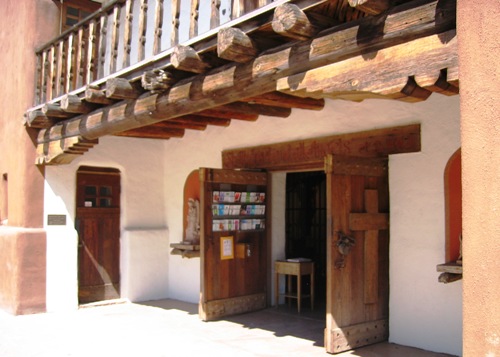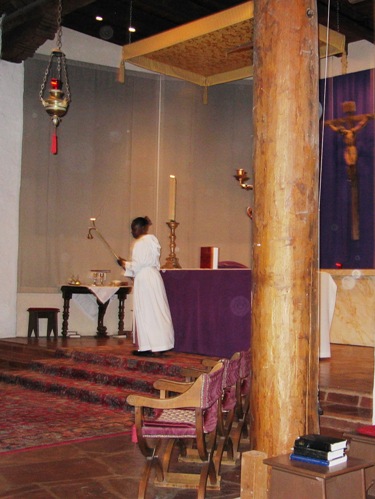I had an interesting day on Sunday. It was full of friendship, crises, mild stress, and more ethical choices than I normally run into in a week. Let me tell you about it.
Act One: Church
 Before church this morning I rushed into my office and, while checking my email, quickly scanned a sermon by Father Douglas. I've had the thing for four weeks, but hadn't yet turned the hard copy into an electronic one. So I put it on my scanner it this morning, in the hope that later I would be able to save the file both as a jpg or something and as a Word file. I needed to do both, because when I do OCR (Optical Character Recognition - cheap software trying to "read" the words), the poor thing gets confused by handwritten edits. I have to type what it's supposed to be, and clean it all up in Word when the OCR is done.
Before church this morning I rushed into my office and, while checking my email, quickly scanned a sermon by Father Douglas. I've had the thing for four weeks, but hadn't yet turned the hard copy into an electronic one. So I put it on my scanner it this morning, in the hope that later I would be able to save the file both as a jpg or something and as a Word file. I needed to do both, because when I do OCR (Optical Character Recognition - cheap software trying to "read" the words), the poor thing gets confused by handwritten edits. I have to type what it's supposed to be, and clean it all up in Word when the OCR is done.So anyway, I had this old sermon I was rushing to get into the computer, because I was afraid Father Douglas would be there and want his sermon back. I should have done the scanning and clean-up before, but I'd put it off, first because of a dead phone line in my office, which resulted in my computer and my scanner being in different rooms; and later because, well, it's a lot of work, and I was busy! By Sunday morning, I didn't have time to do the OCR and corrections. But I did what I could, stuffed the sermon in my purse, and went to church.
It turned out that Father Douglas will be back next week. So I have more time to do this right. Whew!
See, I was already feeling guilty, because I've been a slacker on the church web site lately. I think I didn't get the first half of last week's announcements typed and uploaded until Wednesday, and the second half until Thursday. I still hadn't gotten the Advent Bazaar flyer posted. Bad Karen. No biscuit!
But when I got to church, did anyone complain? They did not. Two different people told me that because of my notice about making egg sandwiches for the Casa Maria soup kitchen, three people who Googled Casa Maria saw that announcement, and drove all the way from nearby Vail, AZ to help make sandwiches on Friday. Good thing that notice was in the Wednesday batch. Had it been in the Thursday announcements, it might not have hit Google in time.
So I got away with those two things for now, but I need to do better.
Then came the real moral dilemmas of the morning.
 1. At the end of Mass, the Sunday School kids came up and sang two verses of O Come O Come Emmanuel. They were so cute! They sang very well, too.
1. At the end of Mass, the Sunday School kids came up and sang two verses of O Come O Come Emmanuel. They were so cute! They sang very well, too. Father John wanted me to take pictures of them, so I obliged. But I was also mindful of Internet security guidelines that I read a few months ago, that one shouldn't post pictures of other people's kids without parental permission, especially if you identify a place where predators can find them, such as at a particular school. Or St. Michael's, I suppose.
So, since I was serving as Mass anyway, and was therefore sitting behind the kids, I took pictures of them from behind. The photo has no identifying features for anyone to use to get to these children. Did I do the right thing? Should I post this picture? I'm not sure, but here it is.
2. About a month ago, two 23-year-old volunteers for a humanitarian group called No More Deaths were arrested by the Border Patrol for driving sick, dehydrated illegal border crossers to a Tucson hospital, on a doctor's advice. No More Deaths provides water and first aid to try to reduce the horrendous, ever-growing number of deaths in the Arizona desert each year, often in cooperation with the Border Patrol. But this time, two people were brought up on federal charges, and could go to prison for 15 years.
The pro bono lawyer for this group was at our church on Sunday, at all three masses. I heard her speak at two of them. The stand the group is making is that it should never be illegal to give humanitarian aid, to provide succor to suffering people in an attempt to prevent needless death. Now understand, these border crossers would have been deported after their hospital stay anyway. Nobody from No More Deaths was trying to smuggle anyone. They were just trying to save lives.
 So anyway, the lawyer handed out lawn signs after church. I ageed to take one, but I didn't promise to put it on my lawn, saying only that I would talk to my husband about it. (John's stance is that he wants to know more about the specific situation from an unbiased source, before putting up the sign). But to be honest, I'm a little afraid to display the sign on our lawn. I agree with it, absolutely, but the border problem is a very divisive issue around here, with a lot of kneejerk sentiment and thinly-veiled prejudice. If I display this thing, will a neighbor take it away? Will I be harrassed? Or will nothing happen at all?
So anyway, the lawyer handed out lawn signs after church. I ageed to take one, but I didn't promise to put it on my lawn, saying only that I would talk to my husband about it. (John's stance is that he wants to know more about the specific situation from an unbiased source, before putting up the sign). But to be honest, I'm a little afraid to display the sign on our lawn. I agree with it, absolutely, but the border problem is a very divisive issue around here, with a lot of kneejerk sentiment and thinly-veiled prejudice. If I display this thing, will a neighbor take it away? Will I be harrassed? Or will nothing happen at all?I'm such a coward sometimes. I hate confrontations and ill-will. I have no problem at all writing about this online, because I can explain the situation. I've even written about this problem before. But a lawn sign has to be its own explanation. Do I trust it to be up to the task, in a neighborhood where I don't know my neighbors?
There's got to be some irony in there, somewhere.
Karen



 Father Smith's sermon today pointed to a much better approach, and St. Michael's sets a much better example. This church and its parishioners feed the homeless, help the sick, and welcome refugees and the marginalized. Despite the current strife over the gay clergy issue, the graphics provided by the Episcopal Church USA send a better message than those who hate others in the name of Jesus. They tell us we are welcome. We are here for each other. We are one.
Father Smith's sermon today pointed to a much better approach, and St. Michael's sets a much better example. This church and its parishioners feed the homeless, help the sick, and welcome refugees and the marginalized. Despite the current strife over the gay clergy issue, the graphics provided by the Episcopal Church USA send a better message than those who hate others in the name of Jesus. They tell us we are welcome. We are here for each other. We are one.






 Now, the main reason I never knew that door went up to the loft was that I always assumed that this other external door was the way up to the choir loft (except that the choir never goes up to the loft). This door is on a balcony above the main double doors. I don't know how you would even get up to this door to go through it. Perhaps a ladder? And if you do, I'm still not sure what you'd find on the other side. I didn't see that door from inside the loft. Maybe it's where the bells are. Or maybe I just didn't notice it. Either way, the mystery of the upper door remains unresolved. I could ask Father Smith or Alicia, but where's the fun in that?
Now, the main reason I never knew that door went up to the loft was that I always assumed that this other external door was the way up to the choir loft (except that the choir never goes up to the loft). This door is on a balcony above the main double doors. I don't know how you would even get up to this door to go through it. Perhaps a ladder? And if you do, I'm still not sure what you'd find on the other side. I didn't see that door from inside the loft. Maybe it's where the bells are. Or maybe I just didn't notice it. Either way, the mystery of the upper door remains unresolved. I could ask Father Smith or Alicia, but where's the fun in that?












 Yesterday was Ash Wednesday, of course, the first day of Lent. "Already?" some of you may have thought. "Isn't it awfully early this year?" Well yes, it was about as early as it gets. Due to the complex and rather confusing
Yesterday was Ash Wednesday, of course, the first day of Lent. "Already?" some of you may have thought. "Isn't it awfully early this year?" Well yes, it was about as early as it gets. Due to the complex and rather confusing 













